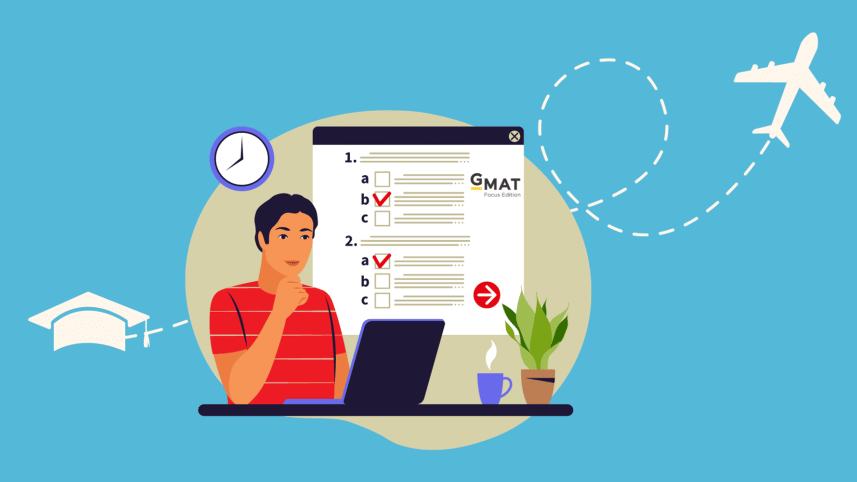Everything you need to know about GMAT Focus

The Graduate Management Admissions Test, more popularly known as the GMAT exam, is a rite of passage for business students and professionals aiming to get into top MBA programs. Offered by the GMAC, the GMAT exam is arguably the benchmark for evaluating a candidate's trajectory and capabilities by most business schools, and can boil down to be the deciding factor between admission and rejection to your dream school.
The GMAT exam has four sections: Quantitative Reasoning, Verbal Reasoning, Integrated Reasoning, and Analytical Writing Assessments. The exam has a total of eighty questions, and spans over a whopping three hours and seven minutes. GMAT scores range from a minimum of 200 to a maximum of 800, and are valid for five years.
Sounds easy enough, right? Well, there's a catch.
The GMAT is a computer adaptive test, meaning that the exam adapts to the examinee's level of ability. Additionally, the three hour duration of the test can be very strenuous on candidates, especially as most test takers are already busy students or jobholders.
Starting November 2023, the GMAC announced a new edition of the GMAT exam, GMAT Focus. This edition of the test is designed in tandem with business schools, to be more efficient and target the essential skills required for business school success. The GMAC plans to completely phase out the old version of the test by early next year, with only GMAT Focus being offered from January 31st, 2024.
So, what makes the Focus edition so different? The biggest change is in the exam's length and duration, with the GMAT Focus clocking in at two hours and fifteen minutes, with an optional ten minute break. The new test also has sixty four questions in total, down from eighty in the regular GMAT. The GMAT Focus eliminates the Integrated Reasoning and Analytical Writing sections, and has three main components, Quantitative Reasoning, Verbal Reasoning, and a newly introduced Data Insights section. Geometry and sentence correction questions are also removed from the new exam, as they weren't considered a good fit for an exam testing business skills. The new data insights section is similar to the current integrated reasoning section, but has an emphasis on the applicant's data analysis and inferential skills.
Furthermore, the GMAT Focus is more flexible, as applicants can choose the order they want to take the exam's sections. Additionally, if the applicant finishes before the section's allotted time, they can go through the exam and change up to 3 answers per section. Focus test scores will all end with a 5, to ensure that admission committees can easily differentiate between the two test variants, thus making the range for GMAT Focus scores between 205 and 805.
When asked why she chose to prepare for the new Focus edition over the current edition, Samia Sayeti, a final-year student at North South University, stated, "The biggest problem I faced while giving mock tests was concentrating deeply for three hours straight. So, I decided to prepare for the Focus edition instead, as it's shorter and more manageable for me. I also feel that there's no point in giving a harder exam when an easier version with the same acceptance at Business schools exists, she explained."
Given that the newly added Data Analysis section is virtually identical to the Integrated Reasoning section, you can still get away with using the existing material. However, new, revised GMAT Focus materials are now available. The most essential resource for the Focus exam is the free Official Starter Kit, which comes with a guided test review, a 70-question sample of all three sections, and two full exam papers. The GMAC also provides a free "Six-Week Study Planner," which outlines key topics to revise, breaks down the required tasks for preparation, and provides a comprehensive study timetable for candidates to use.
As for paid resources, albeit expensive, there are various materials to choose from which range from around $20 to $299. Target Test Prep's comprehensive packages cost $229 monthly to $1,599 for six months. Similarly, Magoosh and Manhattan Prep all provide rigorous online study preparation packages; however, they all cost almost as much, if not four times higher than the test registration fee.
If you want to kickstart your preparation by enrolling in courses at coaching centers, you'll be shocked to know that GMAT preparation courses aren't currently offered in Bangladesh. Even though local centers such as Saifur's and PIE Education offered GMAT courses in the past, they no longer do so, citing lack of demand as the primary reason. However, there are numerous communities and Facebook groups online dedicated to acing the GMAT for advice, as well as a plethora of free content floating around the internet, such as notion boards, PDF documents, and YouTube videos. The GMAT is designed for busy, working individuals and is possible to ace by just self-studying.
Overall, while there are significant changes to the exam's structure, format and content, it's still undeniably recognisable as the GMAT exam.
Taaseen is a student at North South University.
 For all latest news, follow The Daily Star's Google News channel.
For all latest news, follow The Daily Star's Google News channel. 
Comments